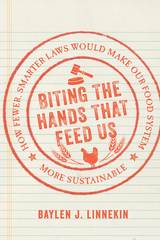
Food waste, hunger, inhumane livestock conditions, disappearing fish stocks—these are exactly the kind of issues we expect food regulations to combat. Yet, today in the United States, laws exist at all levels of government that actually make these problems worse. Baylen Linnekin argues that, too often, government rules handcuff America’s most sustainable farmers, producers, sellers, and consumers, while rewarding those whose practices are anything but sustainable.
Biting the Hands that Feed Us introduces readers to the perverse consequences of many food rules. Some of these rules constrain the sale of “ugly” fruits and vegetables, relegating bushels of tasty but misshapen carrots and strawberries to food waste. Other rules have threatened to treat manure—the lifeblood of organic fertilization—as a toxin. Still other rules prevent sharing food with the homeless and others in need. There are even rules that prohibit people from growing fruits and vegetables in their own yards.
Linnekin also explores what makes for a good food law—often, he explains, these emphasize good outcomes rather than rigid processes. But he urges readers to be wary of efforts to regulate our way to a greener food system, calling instead for empowerment of those working to feed us—and themselves—sustainably.
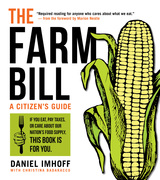
Readers will learn the basic elements of the bill, its origins and history, and perhaps most importantly, the battles that will determine the direction of food policy in the coming years. The authors trace how the legislation has evolved, from its first incarnation during the Great Depression, to today, when America has become the world’s leading agricultural powerhouse. They explain the three main components of the bill—farm subsidies, food stamps or SNAP, and conservation programs—as well as how crucial public policies are changing.
With a new farm bill just signed into law, we all need to understand the implications of food policy. What’s the impact of crop insurance? How does SNAP actually work? What would it take to create a healthier, more sustainable food system? These are questions that affect not only farmers, but everyone who eats. If you care about the answers, The Farm Bill is your guide.
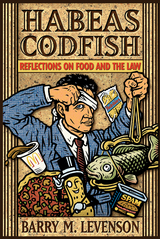
From the McDonald’s hot coffee case to the cattle ranchers’ beef with Oprah Winfrey, from the old English "Assize of Bread" to current nutrition labeling laws, what we eat and how we eat are shaped as much by legal regulations as by personal taste. Barry M. Levenson, the curator of the world-famous (really!) Mount Horeb Mustard Museum and a self-proclaimed "recovering lawyer," offers in Habeas Codfish an entertaining and expert overview of the frustrating, frightening, and funny intersections of food and the law.
Discover how Mr. Peanut shaped the law of trademark infringement for the entire food industry. Consider the plight of the restaurant owner besmirched by a journalist’s negative review. Find out how traditional Jewish laws of kashrut ran afoul of the First Amendment. Prison meals, butter vs. margarine, definitions of organic food, undercover ABC reporters at the Food Lion, the Massachusetts Supreme Court case that saved fish chowder, even recipes—it’s all in here, so tuck in!
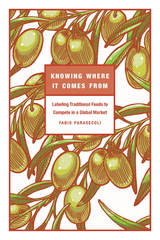
Labeling regimes have moved beyond intellectual property to embrace community-based protections, intangible cultural heritage, cultural landscapes, and indigenous knowledge. Reflecting a rich array of juridical, regulatory, and activist perspectives, these approaches seek to level the playing field on which food producers and consumers interact.
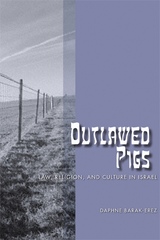
Daphne Barak-Erez specifically traces the course of two laws, one that authorized municipalities to ban the possession and trading in pork within their jurisdiction and another law that forbids pig breeding throughout Israel, except for areas populated mainly by Christians. Her analysis offers a comprehensive, decade-by-decade discussion of the overall relationship between law and culture since the inception of the Israeli nation-state.
By examining ever-fluctuating Israeli popular opinion on Israel's two laws outlawing the trade and possession of pigs, Barak-Erez finds an interesting and accessible way to explore the complex interplay of law, religion, and culture in modern Israel, and more specifically a microcosm for the larger question of which lies more at the foundation of Israeli state law: religion or cultural tradition.
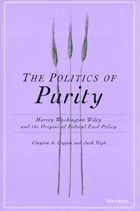
Coppin and High discuss such issues as Wiley's efforts to assign the law's enforcement to his own bureau. They go on to expose the selectivity of Wiley's enforcement of the law, in which he manipulated commercial competition in order to reward firms that supported him and penalize those that opposed him. By examining the history of the law's movement, the authors show that, rather than acting in the public interest, Wiley used the Pure Food and Drugs Act to further his own power and success. Finally, they analyze government regulation itself as the outcome of two distinct competitive processes, one that takes place in the market, the other in the polity.
The book will interest scholars concerned with government regulation, including those in economics, political science, history, and business.
Clayton Coppin is a management consultant and historian, Koch Industries, Wichita. Jack High is Professor of Economics, George Mason University.
READERS
Browse our collection.
PUBLISHERS
See BiblioVault's publisher services.
STUDENT SERVICES
Files for college accessibility offices.
UChicago Accessibility Resources
home | accessibility | search | about | contact us
BiblioVault ® 2001 - 2024
The University of Chicago Press









